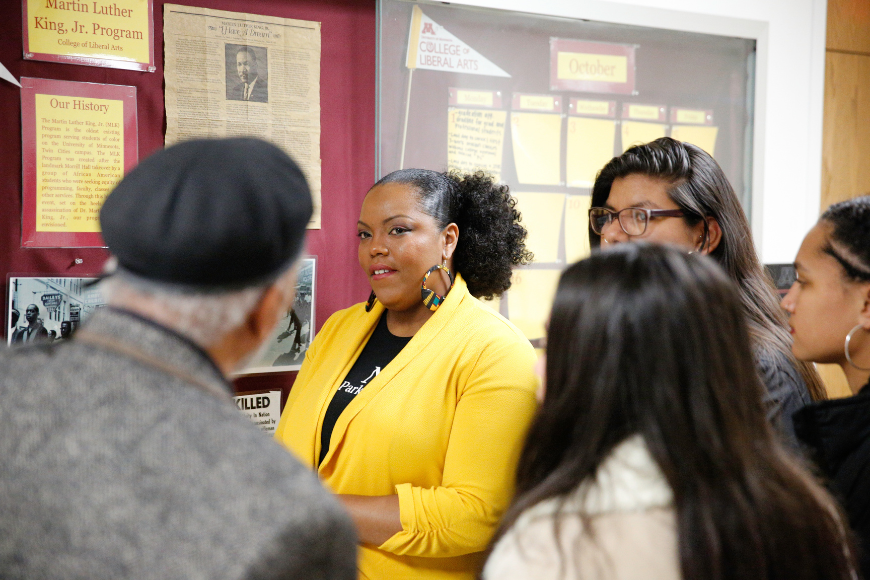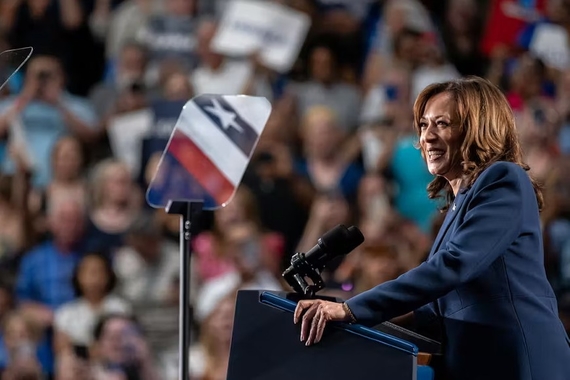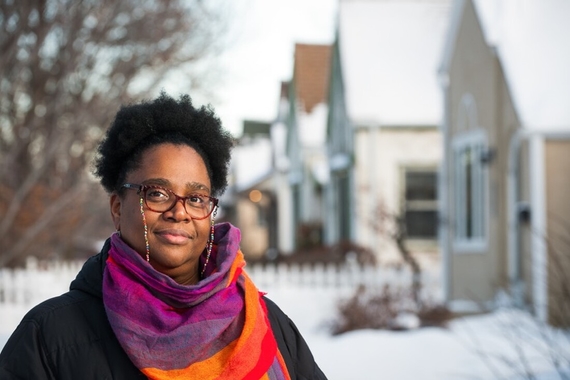A "Heart Knowledge" Learned by Living
Meet Melanie Johnson, assistant director of Justice, Equity, Diversity and Inclusion in the Rev. Dr. Martin Luther King, Jr. Program and academic advisor for African American & African Studies students. Since 2016, Johnson has been a part of CLA—showing up authentically for her students and colleagues while striving to cultivate a beloved community. And along the way, Johnson has discovered just how much she has to learn from the students whom she serves, a “heart knowledge” that can only be learned by living.
Tell us about the Rev. Dr. Martin Luther King, Jr. Program.
Students enter into our program and receive college advising from the moment they begin at the University until they graduate. We typically offer 250 spots for first-year and 250 for spots for transfer students every academic year, but we continue to build our capacity, my associate director role is new, that has allowed us to serve up to 1,300 students per year. We are intentional about those numbers because we want students to have that accessibility to their advisors and not have to wait a long period of time to see them.
We also have a first-year experience course that all of our first-year students are in. We operate affinity groups and offer student programming—speakers, art nights, immersion experiences—and we try our very best to build partnerships throughout the campus so that students don’t just experience authenticity in our space. We want them to have a good experience here but we don’t want that to be their only good experience.
What is the program’s impact?
I think that, from its origin to where we stand now, it was always intended to be a place where students felt like they were seen and known. Our process and the way we have approached advising has been: “I know the stories of my students and students know my story,” where we allow students to tell us who they are and what they’re wanting to do, and what their expectations are, and share authentically ourselves, too.
In a lot of ways, we’ve been trying to capture and recapture the essence of what the program was and to make sure that we’re continuing to align our hearts with that mission—providing students with experiences that enhance their understanding of diversity, social and racial justice, and collective activism.
We want students to know that this is a place where they can increase their knowledge and equip them with the tools to understand their history so they can forge their future.
This is such an inspiring model for students. What is the impact on staff advisors?
It has had the deepest impact I have ever felt in a staff or organization setting. We have been really intentional in making sure that we aren’t expecting authenticity from our students and then in return, compartmentalizing and only showing pieces of ourselves to our students and colleagues. It’s a holistic approach that we take in advising and with each other. Because community can be messy! When you actually deeply care about the mission, you get a few passionate folks in the room trying to move the mission forward, while at the same time life is happening. Our director Alexander Hines recognizes this and continuously cultivates a culture where we are real in community to one another; we are committed inside and outside the organization in our social justice work and in our identity work. He is all about building this out of people—it’s hard not to reciprocate that in our culture and team.
What is the most fulfilling aspect of your job?
From the time a student starts here at the University, they are in the classroom, not just learning how to navigate the institution but also exploring their own identity development and doing that in an academic setting. As an instructor and as an advisor, getting to wear all of these hats at one time is so powerful—the stories, the things that I’ve learned. Sometimes I think, ‘let me sit down and you can teach the class!’ Students are brilliant.
And some of them have had to earn their story, have had to earn their knowledge in a way that isn’t intellectual knowledge, it’s heart knowledge. It’s a knowing. The knowing part of social justice that can only be learned by living.
It has been fulfilling to engage with students in that space and to also empower them, to say, ‘hey I’m a teacher and a learner in this space with you and we’re going to engage together. I can help you navigate how to get to the Library, but you’re teaching me how to navigate being my authentic self as a professional, as a person that you’re looking up to.’
Those are the lessons that I’m learning from being in relationship with these students.
Looking back at the Past, Present, Future: Fifty Years of the Rev. Dr. Martin Luther King, Jr. Program video that was made in 2019, so much of our world and Minnesota has changed since then. From your perspective, how has the program evolved to meet students’ changing needs?
This is a question we’ve been grappling with. George Floyd’s murder didn’t happen in a vacuum—there was a pandemic and there was a multidemic that was happening for folks of color.
As a result, the students who are coming into the university have different demands, different ideas, and thoughts around activism that have really caused us to sit back and think about how we want to shape and continue to shape our program. Our students are asking, ‘tell me about the safety of Black students on campus. Is this a place I can be safe at night and during the day? What is your relationship with the police department? Do you call the police if there’s a disturbance in your office?’ These are real questions; new, salient things that are at the forefront of everyone’s minds.
Students also want to know who our donors are, not necessarily coming from a ‘cancel culture’ perspective, but to fully know if those individuals align with Dr. King and what he was trying to accomplish.
We’re also learning that, students are just in it. There’s no other way to describe it. They want authenticity and a deeper way. They want to be proud to say they’re a part of the program and that it aligns with their values, heart, time, energy, purpose, and plan to build their futures. That’s the difference.
There’s an additional burden and heaviness that students have around their mental health and being able to name their racial battle fatigue. With these catalytic things that are happening, for them, it’s like, that was down the street from my house. This is my neighborhood. This is my community, two blocks away from where Philando Castile was gunned down.
I wish I could take that heaviness away. I wish that at a young age they didn’t have this much burden and this much hurt just from living.
What are some of the biggest challenges our students of color face today?
More and more, not just in higher ed, but in K-12 education, too, the idea around their existence is considered a threat. We see ethnic studies programs, critical race theory, all of the ways in which they can discover who they are coming under fire and scrutiny.
Students are searching then, really intentionally searching, for that sense of inclusivity, belonging, and welcoming, which is not something that can be necessarily done by just saying ‘hey we welcome you, here’s a t-shirt.’ That has to be evident in the classroom, outside the classroom, in their housing, even if it’s in community with folks who don’t look exactly like them but who have shared experiences around identity and expression.
It’s the thing that keeps us going. We aren’t the solution, we are a part of the solution. We can’t take that all in and say that if we don’t do it, it just won’t get done; we know that’s not sustainable. But in our office, small but mighty, we have an understanding that it is a community effort and we have to hold our colleagues and institutions accountable for living that out. By having a seat at the table to say how we best live out the diversity that we keep speaking of. Can we go beyond the numbers? How do we actually create this beloved community?
If you had a magic wand and unlimited funds, what would you do to better serve your students?
We have so much work to do. If I could wave my wand, looking specifically at the MLK Program, I would want full scholarships for our first-generation, BIPOC-identifying students. I would love to create strategic roadmaps and pathways for students toward employment and mentorship. I would love for us to have more of an infrastructure, including engagement and resources, for undocumented students. And the Rev. Dr. Martin Luther King, Jr. Program wouldn’t just be a CLA program, but a staple program for the entire university.
Anything else you'd like to add?
Everybody that I work with has a life commitment to social justice. When we come together, when we’re making decisions, it’s always from that framework. No one has to explain why, we can just cut right to it. But we’re all still learning, too, in how to show up authentically in this space and encourage students to do the same.
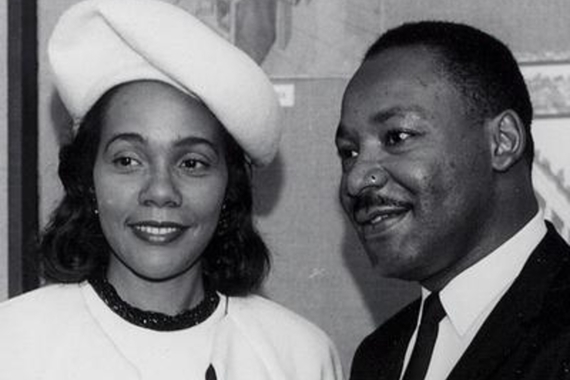
Situated in the College of Liberal Arts (CLA) at the University of Minnesota–Twin Cities and with all CLA undergraduates eligible to join, the MLK Program specializes in serving students who identify as Black, Indigenous, or students of color (BIPOC).
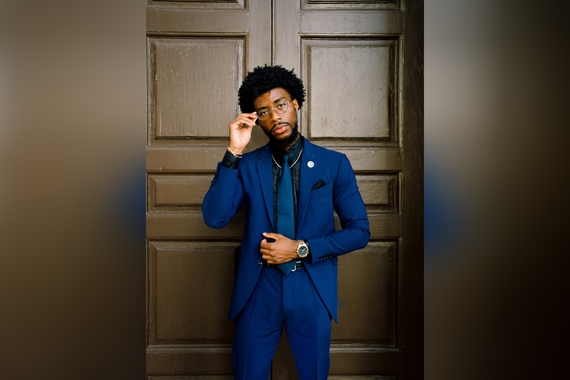
In his own words, psychology alum Ighedosa Ogbeide talks about his time in the MLK Jr. Program, his identity journey, and how his studies inspired him to "read between the lines of the world." Read his story.
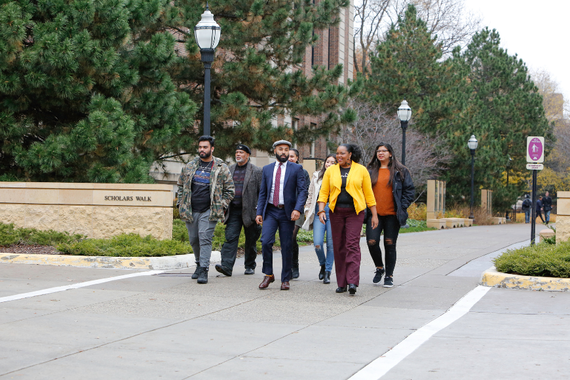
The Rev. Dr. Martin Luther King, Jr. Program celebrated its fiftieth anniversary in 2019. This video celebrates that legacy and features founding member Dr. John Wright, distinguished alumnus Regent Abdul Omari, assistant director Melanie Johnson, and student participants.
